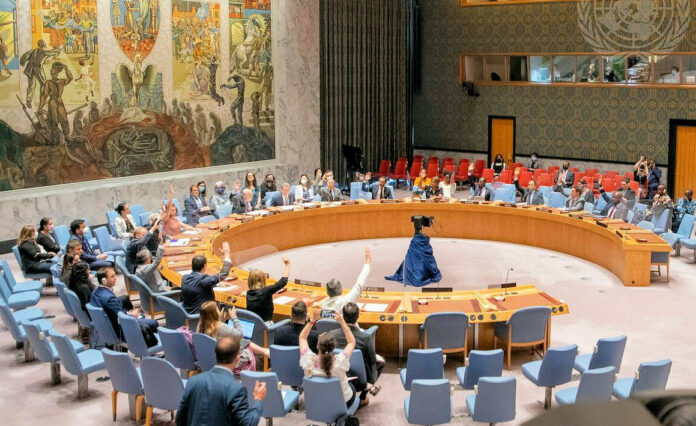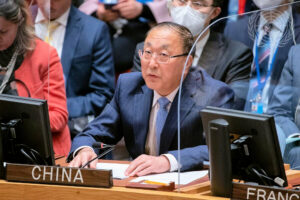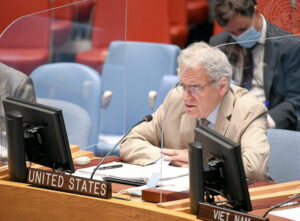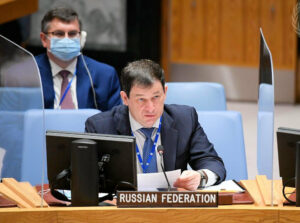
(Français)
On Fri., Jul. 15, 2022, the United Nations Security Council (UNSC) voted unanimously to extend the mandate of the United Nations Integrated Office in Haiti (BINUH) until Jul. 15, 2023, reflecting a compromise between the U.S. and China, two of the body’s five veto-holders.
Following Secretary General António Guterres’ May 10 report to the UNSC, China “called for a six-month renewal of the mission’s mandate… [and] an assessment of the mission with the aim of identifying a drawdown strategy” while the initial version of the resolution, co-written by Washington and Mexico, called for “a 15-month renewal of BINUH’s mandate,” according to the website Security Council Report.
“The negotiations were difficult,” Security Council Report continued, with the resolution going through four drafts, forcing the renewal vote to be postponed from Jul. 13 to Jul. 15. In years past, UNSC resolutions for renewal of Haiti missions were practically rubber-stamped. But “BINUH’s mandate has been contentious since the mission’s inception,” Security Council Report wrote. Russia backed China’s insistence that the mandate be limited to one year.

Multiple UN missions to Haiti, begun almost three decades ago in 1993 following the Sep. 30, 1991 coup d’état against President Jean-Bertrand Aristide, have been illegal under the body’s own founding document.
The UN Charter’s Chapter 7 stipulates that the Security Council can militarily intervene with UN troops “to maintain or restore international peace and security,” meaning a conflict between two or more nations. But Haiti’s woes following both the 1991 and 2004 coups d’état, which triggered two UN military interventions, were purely internal matters, and the Charter’s Chapter 1 forcefully specifies that: “Nothing contained in the present Charter shall authorize the United Nations to intervene in matters which are essentially within the domestic jurisdiction of any state.”
Haitians and their allies have organized countless rallies, conferences, and petitions opposing foreign troops being deployed in the country, an act which is also prohibited by Article 263-1 of Haiti’s 1987 Constitution.
In 2019, the last Chapter 7 force – the United Nations Mission for Justice Support in Haiti (MINUJUSTH) – was withdrawn and replaced by the BINUH, which is only, in Guterres’ words, a “special political mission” operating under Chapter 6, dealing with “Pacific Settlement of Disputes” i.e. with no military or police force. BINUH’s role is only to mediate, advise, and encourage dialogue.
Some Security Council members still want to (illegally) return Haiti to Chapter 7 status but “Haitian officials have conveyed their opposition to international intervention supplanting the [Haitian National Police] HNP’s work, expressing instead a preference for support to increase the HNP’s capacities,” Security Council Report noted.

In Guterres’ May report, he noted that “differences in the mandate and activities of BINUH, in comparison to [the UN Mission to Stabilize Haiti] MINUSTAH and [MINUJUSTH], are mostly unknown by the public.”
The resolution’s only concrete change was to increase BINUH’s size from 30 personnel to 42. The rest of the resolution is a series of calls and recommendations to curb illegal weapon trafficking, encourage political dialogue and compromise among Haitian political leaders, and have UN member states contribute to a “Basket Fund for security assistance.”
The UNSC’s main pre-occupation was the growing power of Haiti’s “gangs.”
“Left unchecked, gangs could develop an almost insurgent capability,” Guterres warned in his report. Indeed, they have “publicly challenged the legitimacy of the interim Government and violently confronted the Prime Minister and called for his resignation.”
Indeed, almost all of Haitian society disputes the legitimacy of the nation’s de facto leadership. Interim Prime Minister Ariel Henry has been anointed, protected, and defended by BINUH’s chief, long-time U.S. State Department official Helen La Lime, who also leads the “CORE Group” of Washington-centric ambassadors.
In its resolution, the UNSC “demands an immediate cessation of gang violence and criminal activities” and threatened “to take appropriate measures, as necessary, that could include assets freeze or travel ban measures, against those engaged in or supporting gang violence, criminal activities, or human rights abuses or who otherwise take action that undermines the peace, stability, and security of Haiti and the region, within 90 days from the adoption of this resolution.”
It was clear from their remarks, however, that none of the Security Council members or UN officials understood (or wanted people to understand) the true nature of the “gang” violence rocking Haiti, putting all armed street organizations into the same “gang” basket.

Dmitry A. Polyanskiy, Russia’s Deputy Permanent Representative to the UN: “The Council must ensure that its decisions allow Haitians to resolve their issues on their own.” Photo: UN Photo/Evan Schneider
The battles occurring today in Port-au-Prince are between an alliance of armed popular anti-crime vigilance brigades (the G9) and a confederacy of truly criminal gangs (G-Pèp) funded by and working for members of Haiti’s bourgeois oligarchy, including elements in the governing alliance.
Resolution 2645 calls for an October 2022 update on the status of elections, which are seen as the solution to Haiti’s turmoil and dysfunction.
Ironically, after initially calling for an end to UN missions in Haiti, China “proposed the inclusion of far-reaching measures in the draft resolution, including ….the establishment of a multinational force to support Haiti’s efforts to fight gang violence,” wrote Security Council Report, a move which would return Haiti to Chapter 7 status. Previously, Washington has been the motive force behind sending UN troops to Haiti. Other UNSC members called for more time to discuss the suggestion.
Nonetheless, Chinese Ambassador Zhang Jun also said that La Lime should follow the “Haitian-led and Haitian-owned” principle in leading the mission “with impartiality” and do the utmost to push for inclusive dialogue.
(Haiti is one of only 12 small nations worldwide which recognize the Chinese province of Taiwan as an independent nation, a diplomatic stance that surely has not escaped China’s notice. Of those 12 nations, only Haiti and Guatemala have populations over 10 million.)
On Jun. 21, thirty Haitian organizations sent an open letter to Presidents Vladimir Putin and Xi Jinping calling on them to “purely and simply oppose the renewal of BINUH’s mandate.”
During the vote, Russian Ambassador Dmitry A. Polyanskiy noted that “increasingly loud Haitian voices are asserting that BINUH is part of the problem” and stressed that “the mission’s main task is to help establish political dialogue.”
“The Council must ensure that its decisions allow Haitians to resolve their issues on their own,” he said.









